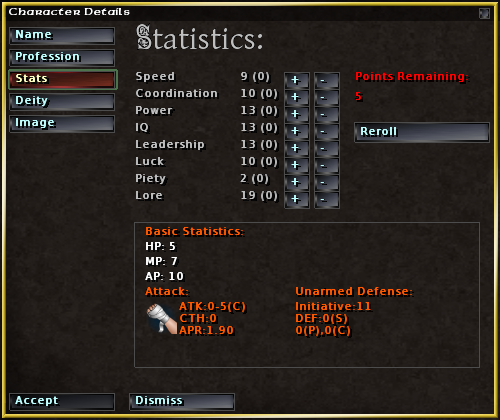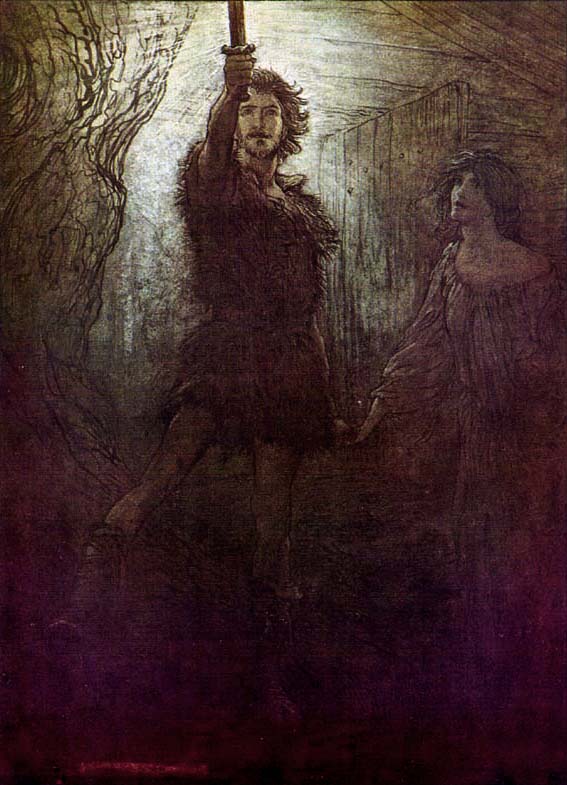|
Statistic (role-playing Games)
A statistic (or stat) in role-playing games is a piece of data that represents a particular aspect of a fictional character. That piece of data is usually a (unitless) integer or, in some cases, a set of dice. For some types of statistics, this value may be accompanied with a descriptive adjective, sometimes called a ''specialisation'' or ''aspect'', that either describes how the character developed that particular score or an affinity for a particular use of that statistic (like ''Specialisations'' in ''Ars Magica'' or ''Attribute Aspects'' in ''Aria''). Most games divide their statistics into several categories. The set of categories actually used in a game system, as well as the precise statistics within each category, vary greatly. The most often used types of statistic include: * Attributes describe to what extent a character possesses natural, in-born characteristics common to all characters. * Advantages and disadvantages are useful or problematic characteristics that ... [...More Info...] [...Related Items...] OR: [Wikipedia] [Google] [Baidu] |
Role-playing Game
A role-playing game (sometimes spelled roleplaying game, RPG) is a game in which players assume the roles of characters in a fictional setting. Players take responsibility for acting out these roles within a narrative, either through literal acting or through a process of structured decision-making regarding character development. Actions taken within many games succeed or fail according to a formal system of rules and guidelines. There are several forms of role-playing games. The original form, sometimes called the tabletop role-playing game (TRPG), is conducted through discussion, whereas in live action role-playing (LARP), players physically perform their characters' actions.(Tychsen et al. 2006:255) "LARPs can be viewed as forming a distinct category of RPG because of two unique features: (a) The players physically embody their characters, and (b) the game takes place in a physical frame. Embodiment means that the physical actions of the player are regarded as those of th ... [...More Info...] [...Related Items...] OR: [Wikipedia] [Google] [Baidu] |
Storytelling System
The ''Storytelling System'' is a role-playing game system created by White Wolf, Inc. for the Chronicles of Darkness (formerly known as the New World of Darkness), a game world with several pen and paper games tied in. The Storytelling System is largely based on the Storyteller System, the rule set used for White Wolf's other, older game setting, the World of Darkness (for a time known as ''old'' or ''classic'' World of Darkness). History Storyteller System While on the road to Gen Con '90, Mark Rein-Hagen came upon the idea of a new game design that would become '' Vampire: The Masquerade''. Tom Dowd, co-designer for ''Shadowrun'', worked with Rein-Hagen to adapt the core mechanics from his previous game success to use d10 instead of d6 for calculating probability. Over the next few years, several games were published under this rule set. The World of Darkness games exclusively used this ruleset, as did '' Street Fighter: The Storytelling Game'' (1995), ''Trinity'' (1999 ... [...More Info...] [...Related Items...] OR: [Wikipedia] [Google] [Baidu] |
Tunnels And Trolls
A tunnel is an underground passageway, dug through surrounding soil, earth or rock, and enclosed except for the entrance and exit, commonly at each end. A pipeline is not a tunnel, though some recent tunnels have used immersed tube construction techniques rather than traditional tunnel boring methods. A tunnel may be for foot or vehicular road traffic, for rail traffic, or for a canal. The central portions of a rapid transit network are usually in the tunnel. Some tunnels are used as sewers or aqueducts to supply water for consumption or for hydroelectric stations. Utility tunnels are used for routing steam, chilled water, electrical power or telecommunication cables, as well as connecting buildings for convenient passage of people and equipment. Secret tunnels are built for military purposes, or by civilians for smuggling of weapons, contraband, or people. Special tunnels, such as wildlife crossings, are built to allow wildlife to cross human-made barriers safely. T ... [...More Info...] [...Related Items...] OR: [Wikipedia] [Google] [Baidu] |
Dice Notation
Dice notation (also known as dice algebra, common dice notation, RPG dice notation, and several other titles) is a system to represent different combinations of dice in wargames and tabletop role-playing games using simple algebra-like notation such as 2d6+12. Standard notation In most tabletop role-playing games, die rolls required by the system are given in the form AdX. ''A'' and ''X'' are variables, separated by the letter ''d'', which stands for ''die'' or ''dice''. The letter ''d'' is most commonly lower-case, but some forms of notation use upper-case ''D'' (non-English texts can use the equivalent form of the first letter of the given language's word for "dice", but also often use the English "d"). *''A'' is the number of dice to be rolled (usually omitted if 1). *''X'' is the number of faces of each dice. For example, if a game calls for a roll of d4 or 1d4, it means "roll one 4-sided die." If the final number is omitted, it is typically assumed to be a six, but in s ... [...More Info...] [...Related Items...] OR: [Wikipedia] [Google] [Baidu] |
Human Physical Appearance
Human physical appearance is the outward phenotype or look of human beings. There are infinite variations in human phenotypes, though society reduces the variability to distinct categories. The physical appearance of humans, in particular those attributes which regarded as important for physical attractiveness, are believed by anthropologists to affect the development of personality significantly and social relations. Humans are acutely sensitive to their physical appearance. Some differences in human appearance are genetics, genetic, others are the result of senescence, age, Lifestyle (sociology), lifestyle or disease, and many are the result of personal adornment. Some people have linked some differences with Race (classification of human beings), ethnicity, such as skeletal shape, prognathism or elongated stride. Different cultures place different degrees of emphasis on physical appearance and its importance to social status and other phenomena. Aspects Various aspects are ... [...More Info...] [...Related Items...] OR: [Wikipedia] [Google] [Baidu] |
Charisma
Charisma () is a personal quality of presence or charm that compels its subjects. Scholars in sociology, political science, psychology, and management reserve the term for a type of leadership seen as extraordinary; in these fields, the term "charisma" is used to describe a particular type of leader who uses "values-based, symbolic, and emotion-laden leader signaling". In Christian theology, the term appears as ''charism'', an endowment or extraordinary power given by the Holy Spirit."Spiritual gifts". ''A Dictionary of the Bible'' by W. R. F. Browning. Oxford University Press Inc. ''Oxford Reference Online''. Oxford University Press. Accessed 22 June 2011. Etymology The English term ''charisma'' is from the Greek (''khárisma''), which means "favor freely given" or "gift of grace". The term and its plural (''charismata'') derive from (''charis''), which means "grace" or indeed "charm" with which it shares the root. Some derivatives from that root (including "grace") have si ... [...More Info...] [...Related Items...] OR: [Wikipedia] [Google] [Baidu] |
Wisdom
Wisdom, sapience, or sagacity is the ability to contemplate and act using knowledge, experience, understanding, common sense and insight. Wisdom is associated with attributes such as unbiased judgment, compassion, experiential self-knowledge, self-transcendence and non-attachment, and virtues such as ethics and benevolence. Wisdom has been defined in many different ways, including several distinct approaches to assess the characteristics attributed to wisdom. Definitions The '' Oxford English Dictionary'' defines wisdom as "Capacity of judging rightly in matters relating to life and conduct; soundness of judgment in the choice of means and ends; sometimes, less strictly, sound sense, esp. in practical affairs: opp. to folly;" also "Knowledge (esp. of a high or abstruse kind); enlightenment, learning, erudition." Charles Haddon Spurgeon defined wisdom as "the right use of knowledge". Robert I. Sutton and Andrew Hargadon defined the "attitude of wisdom" as "acting ... [...More Info...] [...Related Items...] OR: [Wikipedia] [Google] [Baidu] |
Physical Strength
Physical strength is the measure of a human's exertion of force on physical objects. Increasing physical strength is the goal of strength training. Overview An individual's physical strength is determined by two factors: the cross-sectional area of muscle fibers recruited to generate force and the intensity of the recruitment. Individuals with a high proportion of type I slow twitch muscle fibers will be relatively weaker than a similar individual with a high proportion of type II fast twitch fibers, but would have greater endurance. The genetic inheritance of muscle fiber type sets the outermost boundaries of physical strength possible (barring the use of enhancing agents such as testosterone), although the unique position within this envelope is determined by training. Individual muscle fiber ratios can be determined through a muscle biopsy. Other considerations are the ability to recruit muscle fibers for a particular activity, joint angles, and the length of each limb. F ... [...More Info...] [...Related Items...] OR: [Wikipedia] [Google] [Baidu] |
Property (philosophy)
In logic and philosophy (especially metaphysics), a property is a characteristic of an object; a red object is said to have the property of redness. The property may be considered a form of object in its own right, able to possess other properties. A property, however, differs from individual objects in that it may be instantiated, and often in more than one object. It differs from the logical/mathematical concept of class by not having any concept of extensionality, and from the philosophical concept of class in that a property is considered to be distinct from the objects which possess it. Understanding how different individual entities (or particulars) can in some sense have some of the same properties is the basis of the problem of universals. Terms and usage A property is any member of a class of entities that are capable of being attributed to objects. Terms similar to ''property'' include ''predicable'', ''attribute'', ''quality'', ''feature'', ''characteristic'', ''ty ... [...More Info...] [...Related Items...] OR: [Wikipedia] [Google] [Baidu] |
Scourge Character Creation
A scourge is a whip or lash, especially a multi-thong type, used to inflict severe corporal punishment or self-mortification. It is usually made of leather. Etymology The word is most commonly considered to be derived from Old French ''escorgier'' - "to whip", going further back to the Vulgar Latin ''excorrigiare'': the Latin prefix ''ex''- "out, off" with its additional English meaning of "thoroughly", plus ''corrigia'' - "thong", or in this case "whip". Some connect it to la, excoriare, "to flay", built of two Latin parts, ''ex''- ("off") and , "skin". Description A scourge ( la, flagrum; diminutive: ) consists of a rope with metal balls, bones, and metal spikes. The scourge, or flail, and the crook are the two symbols of power and domination depicted in the hands of Osiris in Egyptian monuments. The shape of the flail or scourge is unchanged throughout history. However, when a scourge is described as a 'flail' as depicted in Egyptian mythology, it may be referring to ... [...More Info...] [...Related Items...] OR: [Wikipedia] [Google] [Baidu] |
Race (fantasy)
Fantasy tropes are a specific type of literary tropes (recurring themes) that occur in fantasy fiction. Worldbuilding, plot, and characterization have many common conventions, many of them having ultimately originated in myth and folklore. J. R. R. Tolkien's legendarium (and in particular, ''The Lord of the Rings'') for example, was inspired from a variety of different sources including Germanic, Finnish, Greek, Celtic and Slavic myths. Literary fantasy works operate using these tropes, while others use them in a revisionist manner, making the tropes over for various reasons such as for comic effect, and to create something fresh (a method that often generates new clichés). Good vs. evil The conflict of good against evil is a theme in the many popular forms of fantasy; normally, evil characters invade and disrupt the good characters' lands. J. R. R. Tolkien delved into the nature of good and evil in ''The Lord of the Rings'', but many of those who followed him use the ... [...More Info...] [...Related Items...] OR: [Wikipedia] [Google] [Baidu] |
Character Class
In tabletop games and video games, a character class is a job or profession commonly used to differentiate the abilities of different game characters. In role-playing games (RPGs), character classes aggregate several abilities and aptitudes, and may also detail aspects of background and social standing, or impose behavior restrictions. Classes may be considered to represent archetypes, or specific careers. RPG systems that employ character classes often subdivide them into levels of accomplishment, to be attained by players during the course of the game. It is common for a character to remain in the same class for its lifetime; although some games allow characters to change class, or attain multiple classes. Some systems eschew the use of classes and levels entirely; others hybridize them with skill-based systems or emulate them with character templates. In shooter games and other cooperative video games, classes are generally distinct roles with specific purposes, weapons o ... [...More Info...] [...Related Items...] OR: [Wikipedia] [Google] [Baidu] |








